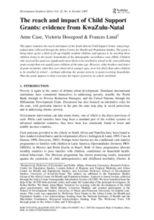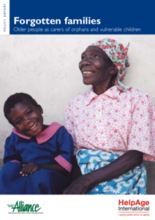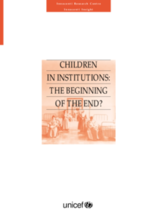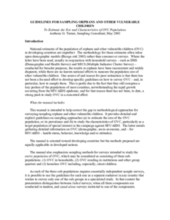Displaying 14221 - 14230 of 14580
This research paper evaluates the impact of the Child Support Grant in South Africa. It finds that while there exists a strong commitment to implementation, the presence of a child’s mother is an important factor in program participation.
A brief policy report which highlights issues faced by older caregivers of orphans and vulnerable children in Africa. Outlines NGO responses, challenges and recommendations for programmatic support of older caregivers. Includes statistical data on ageing, HIV/AIDS and kinship care in Africa.
A paper discussing the shortcomings of systems in which separated children are placed into residential/ institutional forms of care. It also considers community-based and some other forms of care as alternative approaches to preventing unnecessary separation of children from their families.
A statement, by UNICEF for the Stockholm Conference on Residential Care, which recommends a move away from institutional care for children and offers the ‘protective environment’ framework as a solution which encourages protective legislations and policies, public debate, government commitment and the need to listen to the children. The statement includes lessons learned about the issue of children without family care and recommendations for reform.
This publication provides an account of historical processes in Spain and Italy which have led to a transformation of social child protection policies and an abandonment of the most widely-used mechanism of social exclusion, namely institutionalization.
A sample survey designed to be used in interviewing parents and guardians of children ages six to twelve years old. The questions assess household financial security, socio-demographic and community characteristics, psychosocial intervention exposure, income generation intervention exposure, health status, HIV/AIDS prevention exposure, legal rights, and coping skills. Includes sample consent form.
A research study on the policies, finances and current state of care of vulnerable children in Tajikistan. Includes data on budgeting and expenditures around institutional care, as well as recommendations for the creation of short-term and long-term care alternatives.
This report is the result of a seminar held in Kazakhstan 2004. It focuses on social welfare sector reform, and includes topics such as expanding legislative agendas and financing frameworks, as well as gate keeping. Case studies of reform processes from Romania, Tajikistan and Serbia are discussed. Includes conference agenda.
A paper in a series of papers that discusses the problems associated with changing social protection services and provides guidelines to aid countries restructure their financing systems for social care. The paper proposes more family-based and inclusive care programs and less institutional care.
A manual which seeks to fill the gap in the methods of estimating the population of orphans and vulnerable children in developing countries. The manual includes thorough guidelines on sampling approaches.







